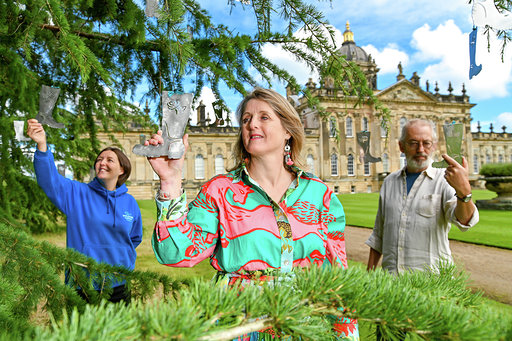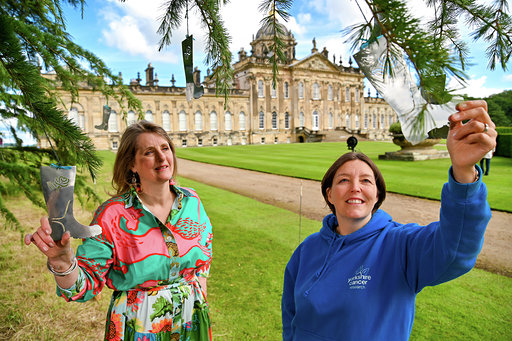
BOOTIFUL. Harrogate artist Anita Bowerman has launched a wellington boot-themed art installation at Castle Howard to highlight Yorkshire Cancer Research’s annual fundraising campaign, Give it Some Welly.
The 191 stainless-steel wellies, shimmering in the sunlight in a Lime Walk tree to the side of the Atlas Fountain, represent the 191,000 Yorkshire people who have “given the cancer the boot” over the past 25 years or live with it.
The mission of the independent charity is to save lives in Yorkshire, helping people to avoid and survive the disease by improving the prevention, early diagnosis and treatment of cancer in the region.
Anita’s “Tree of Life” sculpture on the South Front of the Castle Howard grounds will be open to the public until August 3, drawing attention to the charity’s aim to raise £10 million this year to “help more people give cancer the boot for good”.
In particular, Yorkshire Cancer Research is urging people across Yorkshire to hold fundraising events on Yorkshire Day, Saturday, August 1, whether by wanging wellies, wearing them or baking welly-themed cakes.
Anita, the paper-cut designer and painter who runs the Dove Tree Art Gallery and studio in Harrogate, is honoured to be involved in this “very worthwhile project”.

“I felt instantly inspired to create this boot design, cut out from stainless-steel and featuring Yorkshire Cancer Research’s logo of a rose,” she says. “I love the idea of 191 shiny boots on this ‘tree of life’, glinting in the light on a fir tree in the grounds in front of the majestic, iconic Castle Howard, and I hope it brings lots of joy to those that see it.
“I would like it to celebrate all the people in Yorkshire who have survived cancer in the past 25 years, and the people that will continue to survive in the years to come.”
The work of Yorkshire Cancer Research has resonance for Anita. “My engineer brother, Mason Small, has helped me create these 15cm-high boots – which took three men three days to polish by hand at his Guiseley head office – and finding a cure for cancer is particularly relevant to us as both our parents were diagnosed with it. Our dad had breast and skin cancer; our mum had ovarian cancer, from which she died,” she says.
“I hope the piece helps people consider the work that still needs to be done to continue to increase survival rates in Yorkshire and will help Yorkshire Cancer Research to continue its great work across the region.”
She is delighted by the choice of tree for the welly installation. “I was approached by Yorkshire Cancer Research to do a piece of ‘land art’ for the Give it Some Welly campaign, and I’m so pleased the wellies are hanging in a Cedrus Deodara, a divine tree from the Himalayas, worshipped by Hindus,” says Anita. “I love how it is now decorated for summer, with the stainless-steel boots glistening like mobiles in the summer light.

“They look stunning in this beautiful environment, where I wanted to reflect such a high-quality house and the high quality of the work done by Yorkshire Cancer Research.”
Anita’s “Tree of Life” has personal significance too for the Hon. Nicholas Howard, owner of Castle Howard. “I have a connection with it in that I’ve had prostate cancer myself and I’m in the middle of booting it out’. I’ve had targeted radiotherapy and I’m now having hormone treatment, with my readings now being very low, so it really rang a bell with me when Yorkshire Cancer Research contacted me,” he says.
Castle Howard presents spectacular Christmas tree decorations each winter and puts up a tree at Easter too decorated with hand-painted eggs from Salzburg. Now, Anita’s summer tree complements those annual festive celebrations. “It’s always lovely to see an artist reflecting something real in their work, which these 191 boots do, and I love how the tree can be seen from afar to draw people to it because it’s glinting in the sun,” says Nicholas.
“The wellies are just the right size too, when sometimes these things can be strident, but these are lovely objects.”
Given his own experience, Nicholas is keen that the welly installation should play its part in generating much-needed funds for Yorkshire Cancer Research”. “Research is so important, and it would also help if people would get tested early; that would help with treating cancer and that’s something that everyone can do, particularly as they get older,” he says.
“It’s so important that regular testing and inspections go on, and it’s so important to get that message across, especially when men sometimes have that macho attitude that it won’t happen to them, but it’s far better to be tested regularly. They do that with a car, so why not with themselves?”

Also attending the launch was Dr Kathryn Scott, chief executive at Yorkshire Cancer Research, who says: “While it’s positive that survival rates are improving, too many people are still having their lives cut short by cancer. Delays in diagnosis and treatment during the Coronavirus pandemic means we need to do all we can to minimise the impact for people in Yorkshire.
“In the past few months, life has come with increasing challenges and apprehension about what the future might hold, so the continued support of people in Yorkshire means more to us than ever before.
“With our ambitious target to fund £10 million of world-leading research to prevent, diagnose and treat cancer every year, we need the people of Yorkshire to join us in raising life-changing funds, so we can continue our work in helping more people give cancer the boot for good.”
Kathryn says that in these Covid-19 times, delays in diagnosis and treatment of cancer are inevitable. “There will be people with worrying signs that will not have contacted their GP at this time, but early diagnosis is always our message, because cancer is predominantly easier to treat, the earlier the diagnosis,” she stresses.
“We can have a 90 per cent success rate with treating some cancers when diagnosed early, but less than ten per cent when it’s diagnosed late on.”
Yorkshire Cancer Research wants to fund more research and more clinical trials. “They’re shown to give people a better quality of life and improve survival rates, and we want to make Yorkshire a beacon of success in treating cancer,” says Kathryn.

“In clinical trials, we’re rising fast in the national statistics: 9,000 people participated in clinical trials last year funded by Yorkshire and Humber clinical research networks, putting us second on the list.”
To support Give It Some Welly, you can download a free fundraising pack at: ycr.org.uk/welly.
Yorkshire Cancer Research and Castle Howard request you follow UK Government guidelines to stay safe when visiting the installation or organising any fundraising activities. Those guidelines can be found at: gov.uk/coronavirus.
Did you know?
Yorkshire Cancer Research was founded in 1925 and is the largest independent regional cancer charity in England.
In Yorkshire, 594 people are diagnosed with cancer every week.
Yorkshire Cancer Research’s mission is for 2,000 more people to survive cancer every year in Yorkshire.
Yorkshire Cancer Research works in partnership with researchers, clinicians, the NHS, public health bodies and other charities to fund innovative work in prevention, early diagnosis and treatment.
Based at Grove Park Court, off Skipton Road, Harrogate, Yorkshire Cancer Research provides research funding for the University of York, University of Leeds, University of Sheffield and Leeds Teaching Hospital Trust.
For more information, visit yorkshirecancerresearch.org.uk.
